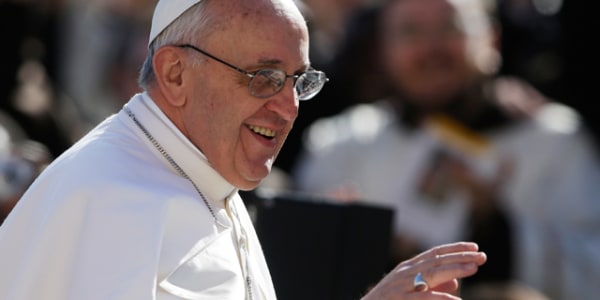Slideshow 82 photos
The election of Pope Francis
He dresses modestly, pays his own hotel bills, personally greets parishioners and insists on taking the bus with his colleagues instead of riding in his lush private car.
Pope Francis has held Catholicism’s highest position for less than a week, and yet he has already grabbed the attention of Catholics and non-Catholics alike with his humble, down-to-earth style of leadership.
Experts say it’s a smart move for a man who has just picked to lead an organization desperate to regain the public’s trust and reinvigorate its many workers. In fact, it’s something that many American chief executive officers could learn from.
“Leadership of anything means mission first and your self-interest last,” said Michael Useem, director of the Center for Leadership and Change Management at the University of Pennsylvania’s Wharton School. “That’s the very definition of what it means to lead.”
There’s no doubt that most chief executives work hard on behalf of their employees, customers and shareholders. But experts note that in recent years, many also have become further and further removed from both the lifestyle of their employees and workings of their companies.
“Weirdly enough, in this Woodstock generation, (CEOs) are more insulated and pampered and elevated than any before,” said Jeffrey Sonnenfeld, head of The Chief Executive Leadership Institute at the Yale School of Management.
Many large-company CEOs travel by corporate jet and work in offices that could be thousands of miles from the shop floor, surrounded by a staff of aides and public relations experts who limit their exposure to employees, investors and the public.
It’s also no longer uncommon to demand compensation packages in the tens or even hundreds of millions of dollars. The lavish pay was a main theme of recent protests about the growing gap between the so-called 1 percent of the nation’s wealthiest taxpayers and the remaining 99 percent of the public.
Pope Francis seems intent on going in the opposite direction. His now-famous frugal lifestyle is in contrast even to many others in the Roman Catholic Church and also is a powerful symbol of his commitment to building what he recently termed “a poor church for the poor.”
That mission comes after several years in which the church has been plagued by scandal and struggled to adjust to changing mores.
Chief executives acting in a time of crisis also can build, or ruin, their reputations depending on the examples they set.
Former Citigroup CEO Vikram Pandit drew accolades in 2009 when he agreed to take a salary of just $1 as the nation was grappling with a recession and the results of the financial crisis. But not long after, he was seen as a symbol of overly lavish pay when Citi’s shareholders voted down his $15 million pay package. He stepped down last fall.
It’s about perks as well as pay. Newly appointed Yahoo Chief Executive Marissa Mayer drew intense criticism from some working parents after her company’s decision to ban employees from working from home, especially when reports surfaced that Mayer had allegedly built a nursery next to her office for her own young son.
Some chief executives have found that they are able to build morale, and gain customers, by regularly mixing among their workers. Sonnenfeld noted that JetBlue Airways founder David Neeleman was known for regularly flying in coach alongside his customers and even occasionally working as a flight attendant.
The style drew a lot of acclaim, but he was replaced in 2007 after the company suffered a big black eye over storm-related travel snafus. He has since founded Azul Brazilian Airlines.
Donald Hambrick, a management professor at Pennsylvania State University’s Smeal College of Business who has studied CEO narcissism, said chief executives who spend time with rank-and-file employees may have more information on which to base decisions than those who only surround themselves with top execs and other CEOs.
Still, he said that to be an effective leader you also have to make clear that although you are listening to your employees and customers, you are in charge and will ultimately make the tough calls.
Hambrick said there’s no strong evidence that being humble makes you a better leader. But he also noted that there’s no evidence that being particularly authoritarian works better, either.
“If you can lead an organization without making people miserable, why don’t you do it that way?” Hambrick said. “There’s no evidence that you have to make people miserable to be a good leader.”
Related:
